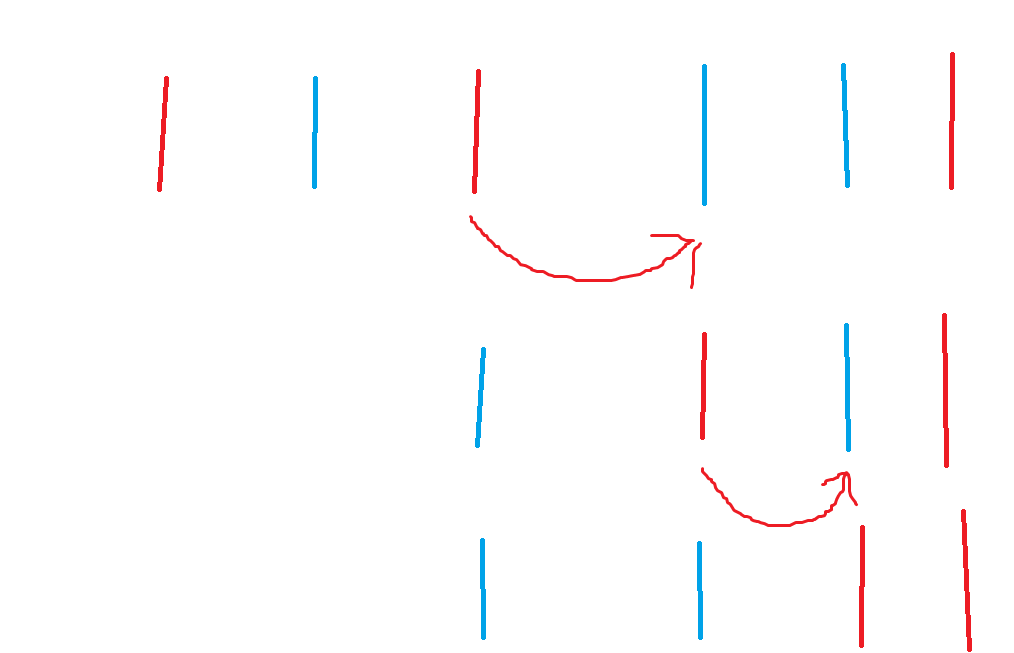P3939 数颜色 题解
题目链接:数颜色
经典题目了,暴力数据结构随便过,不过这种不带修的单个颜色的数量查找有个经典的做法:分桶+二分。具体的为每个颜色分桶,记录有序下标,这样就可以二分出 \([l,r]\) 上的下标个数。对于一次交换来说,如果相邻的颜色相同那么并不会发生交换,如果不同那么就发生交换,由于下标在桶里,我们还需要同时维护桶内下标所在的有序下标序列编号 \(id\),交换时需要将二者交换了,即交换二者所在的桶,由于下标不断往前往后一定会触碰到与之相同颜色的下标,而我们相同颜色选择不交换,这样并不会发生下标次序跨越,即跑到有序序列中对应的位置前面或者后面下标的其他地方。

如图,其实每个颜色的下标只会在 \([前一个相同颜色的下标,后一个颜色相同的下标]\) 的范围移动,并不会越界。所以我们的交换只需要交换上述提到的 \(id\) 对应的下标,以及 \(id\) 和数组值即可。
参照代码
#include <bits/stdc++.h>
// #pragma GCC optimize(2)
// #pragma GCC optimize("Ofast,no-stack-protector,unroll-loops,fast-math")
// #pragma GCC target("sse,sse2,sse3,ssse3,sse4.1,sse4.2,avx,avx2,popcnt,tune=native")
#define isPbdsFile
#ifdef isPbdsFile
#include <bits/extc++.h>
#else
#include <ext/pb_ds/priority_queue.hpp>
#include <ext/pb_ds/hash_policy.hpp>
#include <ext/pb_ds/tree_policy.hpp>
#include <ext/pb_ds/trie_policy.hpp>
#include <ext/pb_ds/tag_and_trait.hpp>
#include <ext/pb_ds/hash_policy.hpp>
#include <ext/pb_ds/list_update_policy.hpp>
#include <ext/pb_ds/assoc_container.hpp>
#include <ext/pb_ds/exception.hpp>
#include <ext/rope>
#endif
using namespace std;
using namespace __gnu_cxx;
using namespace __gnu_pbds;
typedef long long ll;
typedef long double ld;
typedef pair<int, int> pii;
typedef pair<ll, ll> pll;
typedef tuple<int, int, int> tii;
typedef tuple<ll, ll, ll> tll;
typedef unsigned int ui;
typedef unsigned long long ull;
typedef __int128 i128;
#define hash1 unordered_map
#define hash2 gp_hash_table
#define hash3 cc_hash_table
#define stdHeap std::priority_queue
#define pbdsHeap __gnu_pbds::priority_queue
#define sortArr(a, n) sort(a+1,a+n+1)
#define all(v) v.begin(),v.end()
#define yes cout<<"YES"
#define no cout<<"NO"
#define Spider ios_base::sync_with_stdio(false);cin.tie(nullptr);cout.tie(nullptr);
#define MyFile freopen("..\\input.txt", "r", stdin),freopen("..\\output.txt", "w", stdout);
#define forn(i, a, b) for(int i = a; i <= b; i++)
#define forv(i, a, b) for(int i=a;i>=b;i--)
#define ls(x) (x<<1)
#define rs(x) (x<<1|1)
#define endl '\n'
//用于Miller-Rabin
[[maybe_unused]] static int Prime_Number[13] = {0, 2, 3, 5, 7, 11, 13, 17, 19, 23, 29, 31, 37};
template <typename T>
int disc(T* a, int n)
{
return unique(a + 1, a + n + 1) - (a + 1);
}
template <typename T>
T lowBit(T x)
{
return x & -x;
}
template <typename T>
T Rand(T l, T r)
{
static mt19937 Rand(time(nullptr));
uniform_int_distribution<T> dis(l, r);
return dis(Rand);
}
template <typename T1, typename T2>
T1 modt(T1 a, T2 b)
{
return (a % b + b) % b;
}
template <typename T1, typename T2, typename T3>
T1 qPow(T1 a, T2 b, T3 c)
{
a %= c;
T1 ans = 1;
for (; b; b >>= 1, (a *= a) %= c)if (b & 1)(ans *= a) %= c;
return modt(ans, c);
}
template <typename T>
void read(T& x)
{
x = 0;
T sign = 1;
char ch = getchar();
while (!isdigit(ch))
{
if (ch == '-')sign = -1;
ch = getchar();
}
while (isdigit(ch))
{
x = (x << 3) + (x << 1) + (ch ^ 48);
ch = getchar();
}
x *= sign;
}
template <typename T, typename... U>
void read(T& x, U&... y)
{
read(x);
read(y...);
}
template <typename T>
void write(T x)
{
if (typeid(x) == typeid(char))return;
if (x < 0)x = -x, putchar('-');
if (x > 9)write(x / 10);
putchar(x % 10 ^ 48);
}
template <typename C, typename T, typename... U>
void write(C c, T x, U... y)
{
write(x), putchar(c);
write(c, y...);
}
template <typename T11, typename T22, typename T33>
struct T3
{
T11 one;
T22 tow;
T33 three;
bool operator<(const T3 other) const
{
if (one == other.one)
{
if (tow == other.tow)return three < other.three;
return tow < other.tow;
}
return one < other.one;
}
T3() { one = tow = three = 0; }
T3(T11 one, T22 tow, T33 three) : one(one), tow(tow), three(three)
{
}
};
template <typename T1, typename T2>
void uMax(T1& x, T2 y)
{
if (x < y)x = y;
}
template <typename T1, typename T2>
void uMin(T1& x, T2 y)
{
if (x > y)x = y;
}
constexpr int N = 3e5 + 10;
vector<int> pos[N];
int id[N];
int n, m;
int a[N];
inline void solve()
{
cin >> n >> m;
forn(i, 1, n)
{
cin >> a[i];
id[i] = pos[a[i]].size();
pos[a[i]].push_back(i);
}
while (m--)
{
int op;
cin >> op;
if (op == 1)
{
int l, r, c;
cin >> l >> r >> c;
const auto& curr = pos[c];
if (curr.empty() or curr.front() > r or curr.back() < l)
{
cout << 0 << endl;
continue;
}
const int R = ranges::upper_bound(all(curr), r) - curr.begin();
const int L = ranges::lower_bound(all(curr), l) - curr.begin();
cout << R - L << endl;
}
else
{
int x;
cin >> x;
if (a[x] != a[x + 1])
{
const int c1 = a[x], c2 = a[x + 1];
swap(pos[c1][id[x]], pos[c2][id[x + 1]]);
swap(id[x], id[x + 1]);
swap(a[x], a[x + 1]);
}
}
}
}
signed int main()
{
// MyFile
Spider
//------------------------------------------------------
// clock_t start = clock();
int test = 1;
// read(test);
// cin >> test;
forn(i, 1, test)solve();
// while (cin >> n, n)solve();
// while (cin >> test)solve();
// clock_t end = clock();
// cerr << "time = " << double(end - start) / CLOCKS_PER_SEC << "s" << endl;
}
\[最坏时间复杂度为:\ O(m\log{n})
\]



